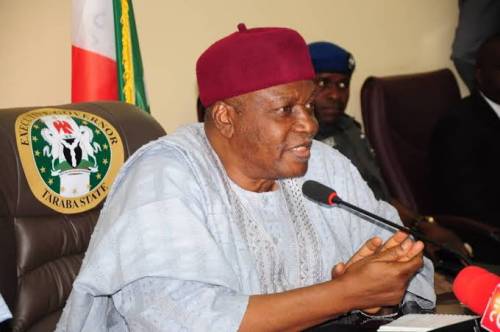
“Taraba can supply the country with rice. I’m seeking for more aid (from President Muhammadu Buhari) towards the farming of rice, particularly the dry season rice, where we get three or four times of that one of the rainy season and more and more people have been encouraged into this farming.
“I have empowered well over 20,000 people and they are all interested in the dry season.”
The governor, who spoke today, December 15 to newsmen shortly after a private audience with the President at the Presidential villa, Abuja, believed that if the state is assisted, it would be able to produce enough rice in this country “because we have the land.”
Governor Ishaku said that the state had so far not been able to access loans that have been approved through the Central Bank of Nigeria (CBN), pleading that urgent action is needed in this regard.
“We also have gotten assistance from Czech Republic to give us long term loan; we have actually manufactured about 2,000 tractors. For over two years, it is stuck in Czech Republic. We have not been able to get those shipped to our farmers.
“And there are other assistances that comes from the federal ministry. Some have reached us which we are utilizing very well.
“But I imagine that without getting this soft machinery assistances, you will not be able to encourage much more people than we already have.
“Because, if they have this small medium tractors, which we had ordered, with their chemicals, fertilizers, and so forth, which usually come from ministries and the federal government, we will go far.
“And even with those places particularly my area, I need to do channelization. I need canals, I need to build a lot of canals to carry this water during the dry season along the coast of the rivers.
“We have Ricer Taraba, River Donga, River Gongola within the state, without those canals, they cannot irrigate.
“We have excess water during rainy season, but then it dries and if we have these canals, we can store this water as a dam, pump it and it will roll down and the farmers use them in their farms.
“I don’t know if you have ever been to Kano: you would see those canals on your way entering Kano. This is the kind of thing I am hoping to do in Taraba.
“We have applied to CBN for years, nothing has happened. And without you doing this, we cannot get the dry season farmers to come on board.
“And as I said earlier, they harvest three to four times more than the rainy season.”
Governor Ishaku said that Taraba is nature’s gift to the nation, saying: “we have all the zones, the seasons, the vegetation, right from Savannah to the trunk rain forest.
“Do you know we grow cocoa in Taraba? Do you know we have palm oil in Taraba? “We have a rubber plantations, all the tropical trees that grow in the tropics they grow in Taraba. And then we have the mountain vegetation that is the only place you can plant coffee and tea.”
He said that his government is encouraging more people to plant tea “and we have gone into coffee now, which is my next step. I hope to do it before I leave office; let coffee also pick up like highland tea picked up.
“Then between the tropical foreign and the savanna, you have the lush vegetation where you plant soybeans.
” Since I came on board about six years ago, we have been giving free beneseed and free soybean seedlings and now a lot of people are growing them.
“There’s still a lot of demand because the beneseed and soya beans are commercial products.
“And now talk of cassava, we are the ones exporting cassava because everywhere in Taraba you can plant cassava and it grows very well.
“So, I can go on and on and lost and now I have been encouraging people to avocado: a lot of people have gone into planting avocado and we are targeting avocado for export and i am working hard also to give a new airport runway for export.
“So, all these our produce if they start coming up before export and not even talked about beef, milk and so on and so forth.
“We have been practicing ranching since in the 60s. So when they are talking about ranching, it is not new to us. All our animals in the mountains are domesticated and they are sweetest meat.”